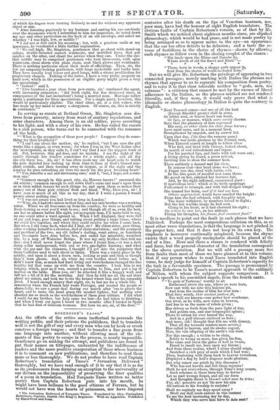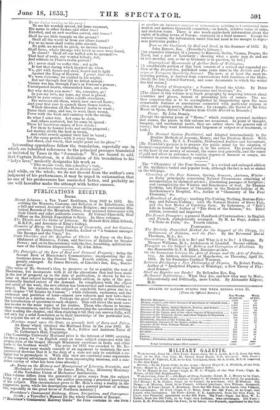ROBERTSON'S TA.SSO. * Ats the efforts of the critics seem ineffectual
to persuade the writing public, and their patrons the publishers, that to translate well is not the gift of any and every man who can by hook or crook construe a foreign tongue ; and that to transfer a fine poem from one language into another, without allowing most of the ele- ments of fine poetry to escape in the process, is nearly impossible. Gentlemen go on making the attempt, and publishers are found to put their names on titlepages, undaunted by the indifference of readers and the more positive exasperation of those whose business it is to comment on new publications, and therefore to read them more or less thoroughly. We do not profess to have read Captain Robertson's translation of Tasso's " Jerusalem Delivered " thoroughly, but we have read enough of it to say that it is as far as its predecessors from forming an exception to the universality of our dictum on the impossibility of preserving the finer qualities of a poem in translation. Had Torquato Tasso written no better poetry than Captain Robertson puts into his mouth, he might have been bellman to the good citizens of Ferrara, but he would not have won the hearts of princesses, nor have lingered
• The Jerusalem Delivered of Torquato Tasso. Translated by Alex. Cuningham Robertson, Captain, Eighth (the King's) Regiment. With an Appendix. Published by Blackwood and Sons.
centuries after his death on the lips of Venetian boatmen, nor, poor man, have had the honour of eight English translators. The obvious faults of Captain Robertson's version, as of that by Mr. Smith which we noticed about eighteen months since, are slipshod phraseology, which would be bad prose, and is not made poetry by being arranged so as to appear metre to the eye—an appearance that the ear too often detects to be delusion; and a taste the re- verse of fastidious in. the choice of rhymes—shown by allowing such rhymes as follow even in the closing couplet of the stanza :
"His lands upon the Rhine and Danube lie, Where dwelt of old the Suevi and Rheti"— "These, born in woods, a shaggy garb appear in, Sent irom the shores of world-secluded Erin."
But we will give Mr. Robertson the privilege of appearing in two connected passages ; merely marking with Italics thephrases and rhymes that appear to us to separate his composition from poetry, and to refer it to that class tolerable neither to " gods, men, nor columns " : a criticism that cannot be met by the excuse of literal adherence to the Italian, as the phrases marked are not rendered literally, and, if they were, it would only prove that what is idiomatic or choice phraseology in Italian is quite the contrary in
English.
"Next Tancred comes—not one of all the host (Except Rinaldo) greater skill in arms, Or loftier soul, or braver heart can boast,
Or face, or manner, which snore surely charms. Save that the phantasy of love engrossed His soul, no other stain his clear fame harms ;
Love amid arms, and in a moment bred, Strengthened by anguish, and by sorrow fed.
Upon that day, ('tis thus the rumour goes,) Which was made glorious by the Persian rout,
When Tancred ceased at length to follow those
Who fled, and tired with victory, looked about, In search of cool refreshment and repose For his parched lips, and limbs with toil worn out ; A living spring he found, a green retreat, Inviting him to shun the summer heat.
There suddenly a damsel met his view, In armour clad—her head alone was bare ;
A Pagan was she, tired with battle, who
In the like quest of needful rest came there. He gazed on her, admired her features fair, And, by the sight inflamed, enamoured grew :
0 marvellous love ! which at its birth upsprings.
Full-armed to triumph, and with full-fledged wings!
She donned her helm, and if it had not been Others approached, would have assailed the knight :
From him she had subdued, with haughty mien The dame withdrew, by numbers forced to flight ; But the fair warlike image he had seen Clung to his heart, as it had charmed his sight ;
On where he sau, her, on her attitude Fixing his thoughts, his flames find constant food."
It is needless to point out the fault in each phrase that we have It is needless to point out the fault in each phrase that we have Italicized. Perhaps the most compendious criticism on this, as on most other verse translations, is that the language is not pitched in
the proper key, and that it does not keep to its own key. The
emphasis is moreover continually misplaced, because the rhyme exacts that a word properly unemphatic should be placed at the end of a line. Here and there a stanza is rendered with felicity and force, but the general character of the translation corresponds to the above quotation. But we will add a passage more free from faults than most of those we have glanced at in this volume, that if any person wishes to read Tasso translated into English verse, he may judge for himself of Captain Robertson's capacity for the task in a favourable specimen. The passage is pronounced by Captain Robertson to be Tasso's nearest approach to the sublimity of Milton, with whom the subject suggests comparison. It is Satan's speech to his assembled angels, from the fourth canto.
" Ye gods of Tartarus! worthy to sit Enthroned above the sun, where ye were born, Now cast with me into this hideous pit, And from the realms of bliss for ever torn :
That fiery wrath, that ancient jealous fit,
Too well are known—our power how overborne. Our rival, as he wills, now rules in heaven, And has to us the name of rebels given ; Has driven us forth from the pure light of day, And golden sun, and star-bespangled sphere ; There to return for ever barred the way, And in a gulf obscure enclosed us here And more, (ah ! thought that fills me with dismay, That all my torment renders more severe,) Has called to heaven, and its abodes august, Man, the vile offspring of the earth's vile dust.
Nor this enough ; a victim to be slain Solely to wrong us more, has given his Son, Who came and burst the gates of hell in twain, Dared to insult me, here upon my throne ; And from these realms, where I alone should reign, Snatched a rich prey of souls which I had won; Then, hastening with them back to heaven victorious, Displayed a flag by hell's disgrace made glorious., But why renew our griefs by this discourse ? Who has not known and felt these injuries ?
Hath he not everywhere, through Time's long course,
Such schemes as these been busy to devise ? Let us past wrongs forget, and all our force
And thoughts direct to thwart what now he tries;
For, ah! perceive ye not 'lls now his aim All nations to his worship to reclaim?
Shall we supinely see days speed away ? Shall our dull souls endure in vile content - To see the host increasing day by day,
Which they who serve him have to Asia sent?
To see Judea boa ing to his sway To see his worship spread, his fame augment, His name in other hymns and other tones Extolled, and on new marbles carved, and bronze?
Shall he our idols trample on the ground ? Shall all the world be from our altars turned ?
For us no more shall votive gifts abound, No gold, no myrrh be given, no incense burned ?
Shall fanes, where throngs who loved us once were found,
Be closed ? Shall all our baffled arts be spurned ?— That host of souls, our wonted tribute, fail, And solitude in Pluto's realm prevail ?
Ah ! never shall we suffer this : not quite Is lost that daring which inspired us, when We, girt with flames and steel, feared not to fight Against the King of Heaven. I grant that then We were o'ercome, we yielded to his might ; But not through fear did we defeat sustain : Victory was his, through Fate's or Fortune's powers ; Unconquered hearts, untarnished fame, are ours.
But why detain you more ? Go, comrades, go ! In you my love, my hope, my trust is placed. Swift be your course ; these caitiffs overthrow, Ere succours aid them, which now onward haste ; And your first care to quench those flames bestow, Which threaten all the Hebrews' realm to waste ; Enter their camp, and use, to work them wrong, Force with the weak and cunning with the strong.
Be what I utter fate. Let some be slain, And others scattered, but let some be spared : These let lascivious snares of love detain ; For them be honied looks and smiles prepared ; Let mutiny divide the host in twain, And rebel swords against their lord be bared ; Let the camp perish—with it every trace,
And shred, and wreck, that might point out its place.' "
Interesting appendices follow the translation, especially one in which are tabulated references to the principal passages translated or imitated by Tasso in the "Jerusalem." We are bound to add, that Captain Robertson, in a dedication of his translation to his " lady e love," modestly designates his work as
This mosaic verse, this schoolboy's task, In numbers tuneless and in diction rude."
And while, on the whole, we do not dissent from the author's own judgment of his performance, it may be urged in extenuation that no one of his predecessors has succeeded better, and probably no one will hereafter make the attempt with better success.



























 Previous page
Previous page